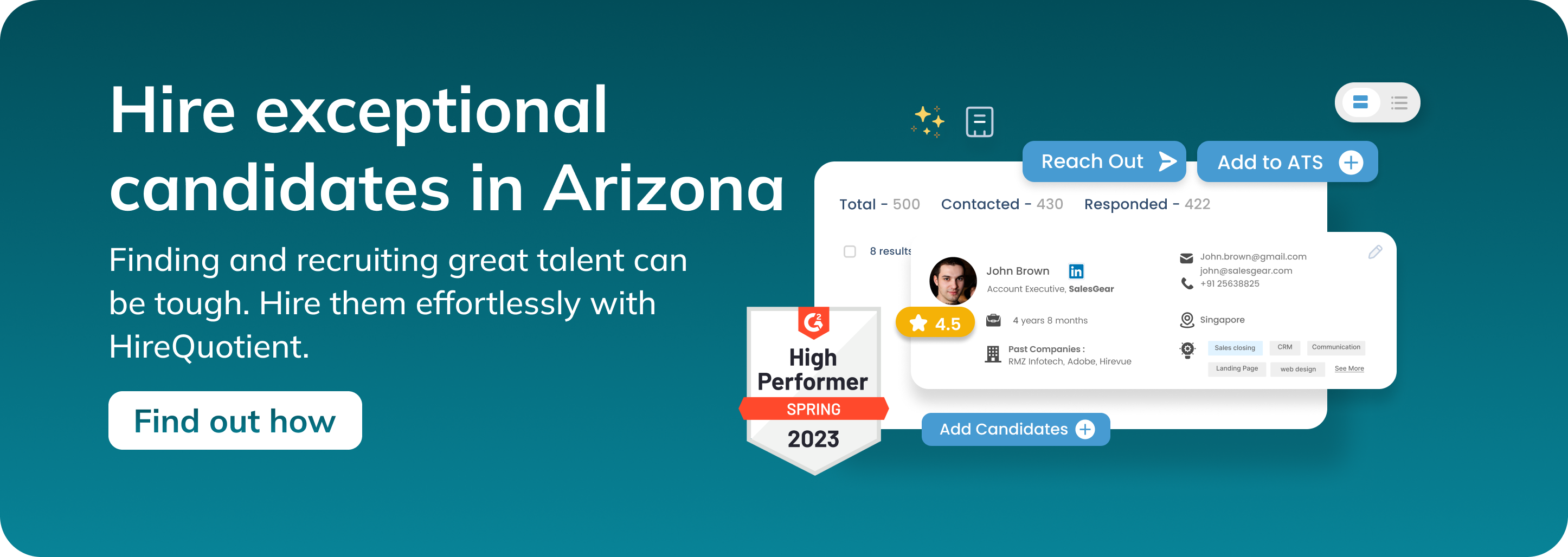What is an Exempt Employee in Arizona?
Published on June 2nd, 2023
When it comes to running a business, hiring and classifying employees is very important. That said, compliance with the law surrounding employee classification is crucial.
As a hiring manager or recruiter, understanding the different classifications of employees under Arizona law is important and not knowing about them can result in potential liabilities and negative consequences.
In this blog post, let's explore
- Concept of exempt employees in Arizona,
- How to classify them,
- And the criteria that determine their classification
So without further ado, let's dive in!
Exempt employees in Arizona are those employees who are highly skilled, salaried, and generally not covered by the minimum wage and overtime provisions under the Fair Labor Standards Act (FLSA).
These employees receive a fixed salary and are paid regardless of the number of hours worked in a week. This differs from the non-exempt employees who are subject to all the provisions of the FLSA, including the entitlement to overtime pay, with few exceptions.
To classify an employee as exempt, certain criteria must be met. One critical criterion that must be satisfied for an employee to be considered an exempt employee is their salary level.
In Arizona, a minimum salary is required for an employee to be classified as exempt. Currently, in Arizona, any employee who earns $455 per week ($23,660 annually) or more is exempt under state and federal law.
Aside from meeting the salary threshold, an employee must also meet a few more criteria - the three most common criteria being executive, administrative, and professional. These positions are commonly referred to as being white-collar jobs. Any employee who does not meet any of these requirements is considered a non-exempt employee.
For employees to qualify as executives, their daily work activities should involve managing at least two full-time employees or more.
In comparison, an administrative employee's role generally involves exercising independent judgment and discretion while performing non-manual work, such as HR, accounting, and payroll.
Lastly, a professional employee is typically someone who works in a field requiring exceptional knowledge and experience, such as doctors, lawyers, accountants, and teachers, among others.
Yet another classification of exempt employees in Arizona is for certain commissioned salespeople. Such salespeople must satisfy the requirements of either one of the primary exemptions listed above or must be involved in sales outside their employer’s place of business.
Also read: What is the Difference Between Exempt And Non-Exempt Employees?
EasySource for Talent Sourcing
EasySource revolutionizes the recruitment process by introducing the world's first fully automated talent-sourcing tool designed specifically for exempt employees. This groundbreaking tool streamlines a recruiter's search for qualified candidates by effortlessly creating a robust talent pipeline with just a few simple clicks.
By leveraging advanced AI-based filters, such as location, skills, education, experience, and US work authorization, EasySource significantly enhances the ease of finding relevant candidates.
In addition to its exceptional features, EasySource incorporates ChatGPT and Generative AI, empowering recruiters to effortlessly send personalized messages to candidates through various platforms, all with the convenience of automation.
With EasySource, recruiters can amplify their LinkedIn searches and effortlessly identify and engage with potential exempt candidates, eliminating the hassle of sifting through countless resumes to discover exceptional talent.
As of my last update, the rules for exempt employees in Arizona are governed by both federal and state labor laws. The primary law that establishes the rules for exempt status is the Fair Labor Standards Act (FLSA) at the federal level, which the U.S. Department of Labor enforces. Arizona also has its labor laws that align with or complement the FLSA.
Here are some key rules for exempt employees in Arizona:
Salary Basis Test: To be classified as exempt, employees must receive a fixed salary that meets the minimum salary threshold set by the FLSA and Arizona state law. As of September 2021, the federal minimum salary threshold for most exemptions is $684 per week ($35,568 annually). However, some exemptions, such as the Highly Compensated Employee exemption, have higher salary thresholds.
Job Duties Test: Exempt employees must perform specific job duties that fall within the criteria outlined by the FLSA and state law. The three main categories of exemptions based on job duties are executive, administrative, and professional exemptions. Each category has distinct criteria regarding the type of work performed and the level of responsibility and decision-making involved.
Overtime Exemption: Exempt employees are not eligible for overtime pay. They are expected to work as many hours as necessary to fulfill their job responsibilities, regardless of whether it exceeds the standard 40-hour workweek.
Record Keeping: Employers must maintain accurate records of exempt employees' salaries, job duties, and hours worked to demonstrate compliance with the FLSA and state labor laws.
Minimum Wage: Exempt employees must still receive at least the minimum wage required by federal and state law for all hours worked.
It's important to note that labor laws can change over time, so employers should stay informed about any updates to federal and Arizona state labor laws that may affect exempt employee classification.
Additionally, employers should consult legal counsel or the Arizona Industrial Commission for specific guidance on complying with exempt employee regulations.
Conclusion
While it’s special to have an exempt employee, organizations have to understand that there is a rigorous framework that must be followed to properly classify employees as exempt. Incorrect classification can bring about liabilities and complications in the future.
Therefore, it is crucial that hiring managers and recruiters understand these classifications, know how to differentiate between exempt and non-exempt employees and follow Arizona’s employment laws to ensure compliance. By doing so, companies can prevent legal and financial challenges that could arise due to mismanagement.

Authors

Radhika Sarraf
Radhika Sarraf is a content specialist and a woman of many passions who currently works at HireQuotient, a leading recruitment SaaS company. She is a versatile writer with experience in creating compelling articles, blogs, social media posts, and marketing collaterals.
Hire the best without stress
Ask us how
Never Miss The Updates
We cover all recruitment, talent analytics, L&D, DEI, pre-employment, candidate screening, and hiring tools. Join our force & subscribe now!
Stay On Top Of Everything In HR


